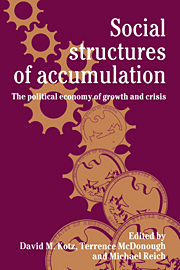Book contents
- Frontmatter
- Contents
- List of contributors
- Introduction
- Part I The theory of social structures of accumulation
- Part II History, institutions, and macroeconomic analysis
- Part III Class, race, and gender
- Part IV The international dimension
- 12 Accumulation and crisis in a small and open economy: the postwar social structure of accumulation in Puerto Rico
- 13 Apartheid and capitalism: social structure of accumulation or contradiction?
- 14 The social structure of accumulation approach and the regulation approach: a US–Japan comparison of the reserve army effect
- 15 The global economy: new edifice or crumbling foundations?
- Afterword: New international institutions and renewed world economic expansion
- Comprehensive bibliography on the SSA approach
- Index
13 - Apartheid and capitalism: social structure of accumulation or contradiction?
Published online by Cambridge University Press: 08 October 2009
- Frontmatter
- Contents
- List of contributors
- Introduction
- Part I The theory of social structures of accumulation
- Part II History, institutions, and macroeconomic analysis
- Part III Class, race, and gender
- Part IV The international dimension
- 12 Accumulation and crisis in a small and open economy: the postwar social structure of accumulation in Puerto Rico
- 13 Apartheid and capitalism: social structure of accumulation or contradiction?
- 14 The social structure of accumulation approach and the regulation approach: a US–Japan comparison of the reserve army effect
- 15 The global economy: new edifice or crumbling foundations?
- Afterword: New international institutions and renewed world economic expansion
- Comprehensive bibliography on the SSA approach
- Index
Summary
Introduction
Several recent radical studies of the South African political economy have drawn on social structures of accumulation (SSA) analysis. These contributions have an inadequate empirical basis, and suffer from the same functionalist leanings as earlier radical understandings of apartheid. This chapter argues that if SSA theory is applied in a meaningful way, the evidence suggests that no stable SSA existed in South Africa during the postwar period. Trends in the empirical data (most notably the rate and share of profit) do not reflect any balance between key economic variables.
Falling profitability, however, does not necessarily suggest a fundamental inadequacy in the institutional structure. If a credible explanation can be provided as to why profitability should be discounted as a key indicator of an SSA, then an exception can be made. As argued below, this is not the case as far as South Africa is concerned. Labor market and cost pressures (often exacerbated by apartheid policies) steadily eroded initially high levels of profitability. Trends in the share and rate of profit reflect the absence of any happy marriage of apartheid and capitalism in terms of a stable institutional structure, or a sustainable growth path.
Developments in the radical understanding of South Africa
Radicals found it relatively easy to argue that the institutions of apartheid (at least during the 1960s) were functional to capitalist development rather than a distortion of it.
- Type
- Chapter
- Information
- Social Structures of AccumulationThe Political Economy of Growth and Crisis, pp. 253 - 273Publisher: Cambridge University PressPrint publication year: 1994
- 3
- Cited by



